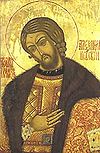- Nikolai Pogodin
-
Nikolai Fyodorovich Pogodin (Russian: Никола́й Фёдорович Пого́дин) (pseudonym of N.F. Stukalov) (16 November [O.S. 3 November] 1900 - September 19, 1962) was a Soviet playwright.
Born into a peasant family at Gundorovskaya Stantsiya in the Don Province, young Nikolai Stukalov "spent a wandering childhood with his mother, who travelled from one Cossack village to another taking in sewing"; he worked as a bookbinder and carpenter before turning to literature and journalism.[1] During the Russian Civil War he served as a volunteer with the Red Army; in 1920 he worked as a reporter for the Rostov-on-Don newspaper Trudovaya zhizn, and was a traveling correspondent for Pravda from 1922 to 1932. From 1925 he lived in Moscow.
With his journalistic background, it is natural that "his plays, particularly the early ones, seemed to be dramatization of factual reports on current events."[2] Temp (Tempo, 1929; presented in 1930 by the Vakhtangov Theater) showed the construction of the Stalingrad Tractor Plant, Poema o topore (Poem of the axe, 1931) was about making stainless steel, and Moi drug (My friend, 1932) features a protagonist struggling to get a factory operating. "The most popular in this series of plays was Aristocrats (1934), a half-serious, half-comical play about the building, by forced labor, of a canal between the White and Baltic Seas. Thieves, bandits, and other convicts, the aristocrats of crime, at first do not want to work but gradually become involved in collective action and are transformed and morally regenerated."[3] This reflected a popular propaganda theme of reforming criminals and class enemies through labor.[4] His most popular play was Chelovek s ruzhyom (Man with a gun, 1937), about Shadrin, a soldier who comes to Petrograd in October 1917 and gets involved in the Revolution; the climax of the play is his meeting with Lenin. The second play in his Lenin trilogy, Kremlyovskie kuranty (The chimes of the Kremlin, 1940), was set in 1920 and featured a scene in which Lenin talks with an old Jewish watchmaker engaged in repairing the Kremlin chimes so they can play the Internationale; the third, Tretya pateticheskaya (The third: Pathetic, 1958) used the news of Lenin's death as a tragic leitmotif. Kogda lomaiutsya kop'ya (When the spears break, 1953) was a comedy; Sonet Petrarki (Petrarch's sonnet, 1956) "takes the position that there are certain individual matters--personal feelings and affairs of the heart--which are none of the collective's or the Party's business."[5]
From 1951 to 1960 Pogodin was the chief editor of the theatrical journal Teatr. He won the Order of Lenin twice and the Stalin Prize twice, and became an Honored Artist of the RSFSR in 1949.
References
- ^ Avril Pyman in A.K. Thorlby (ed.), The Penguin Companion to Literature: European (Penguin, 1969), p. 618.
- ^ Marc Slonim, Russian Theater: From the Empire to the Soviets (New York: Collier, 1962), p. 337.
- ^ Slonim, op. cit.
- ^ Piers Brendon, The Dark Valley: A Panorama of the 1930s, p488-9 ISBN 0-375-40881-9
- ^ Pogodin, Nikolai Fyodorovich in Encyclopedia of Soviet Writers.
Sources
- Pogodin, Nikolai Fyodorovich in Encyclopedia of Soviet Writers
People from Russia Leaders and religious - Pre-1168
- 1168–1917
- 1922–1991
- 1991–present
- RSFSR leaders
- General secretaries
- Soviet premiers (1st deputies)
- Soviet heads of state (and their spouses)
- Prime ministers (1st deputies)
- Foreign ministers
- Prosecutors general
- Metropolitans and patriarchs
- Saints

Military and explorers - Field marshals
- Soviet marshals
- Admirals
- Aviators
- Cosmonauts
Scientists and inventors - Aerospace engineers
- Astronomers and astrophysicists
- Biologists
- Chemists
- Earth scientists
- Electrical engineers
- IT developers
- Linguists and philologists
- Mathematicians
- Naval engineers
- Physicians and psychologists
- Physicists
- Weaponry makers
Artists and writers Sportspeople Chess playersCategories:- 1900 births
- 1962 deaths
- Soviet dramatists and playwrights
- Russian dramatists and playwrights
Wikimedia Foundation. 2010.
